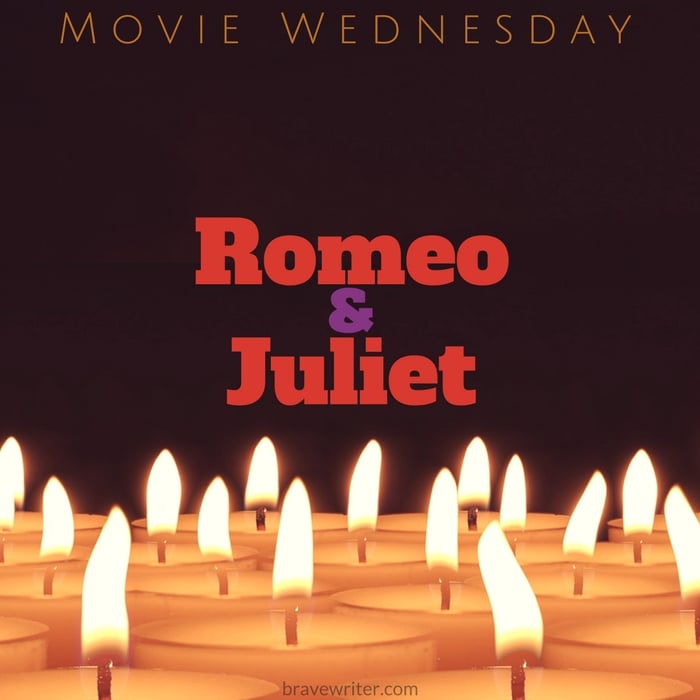Movie Wednesday: Romeo and Juliet

by Amy Frantz, Brave Writer alum
Long ago in the city of Verona, two feuding families, the Montagues and the Capulets, find it impossible to reconcile their differences causing one too many brawls to break out in the streets. But one night, Romeo Montague and his friends sneak into a masked ball held by the Capulets. There Romeo meets Juliet Capulet and without knowing each other’s true identities the two find themselves pulled to one another, only to learn too late that they are from rival families. The star-crossed lovers resolve to marry in secret, but when Romeo is confronted by Juliet’s cousin in the streets of Verona, blades are drawn and the lovers’ fates are set on a cruel course.
[This post contains Amazon affiliate links. When you click on those links to make purchases,
Brave Writer receives compensation at no extra cost to you. Thank you!]
“Two households, both alike in dignity,” is one of the most famous opening lines of a play. Most likely written sometime in the early 1590s, Shakespeare’s Romeo and Juliet spins a tragic tale of love and hate, and deals with themes still desperately relevant to this day such as the nature of inherited prejudice, absentee parenting, and teen suicide. Perhaps that is why it is one of Shakespeare’s most frequently performed and adapted plays.
Romeo and Juliet is credited with coining the phrase “star-crossed lovers.” The expression has become the name of a recognized trope in storytelling and remains popular. It’s a common misconception that the phrase means “two lovers fated to be together.” The actual meaning of the phrase is a pair of lovers “thwarted by the stars.” In other words, the lovers are destined to meet but fate conspires to keep the lovers from remaining together. This trope often ends tragically, as it does in Romeo and Juliet.
In 2013, Romeo and Juliet was adapted to screen (yet again). Starring Douglas Booth and Hailee Steinfeld as the titular lovers, the film features Renaissance inspired wardrobe, a breathtaking score, and was filmed in Italy (locations included Verona, Mantua, and Rome).
The film has drawn criticism for “altering Shakespeare’s text” to be more accessible to a modern audience. However, this critique may be based in a misunderstanding of the texts of Shakespeare.
The versions of Shakespeare’s plays that are nowadays agreed upon and performed were created by editing together from “source texts” which do not always agree with one another. The various Folios and Quartos used to compile the modern versions of the plays often don’t quite line up with each other; there are noticeable variations within them. The plays we know today were created by editors “averaging out” these differences. What we recognize as “what Shakespeare wrote” is actually the result of editing choices made long after his passing, so altering that text isn’t necessarily “changing the words of Shakespeare” so much as editing his editors.
With that in mind, the 2013 film gives the viewer a unique opportunity to experience Romeo and Juliet through real locations and pseudo-period aesthetics but with text somewhat re-imagined for a modern teen audience. So, get ready to be swept up in this classic tale of love and hate, vengeance and redemption, and maybe grab a box of tissues, too.
A note to parents: Romeo and Juliet (2013) is rated PG-13 for violence and thematic elements. We recommend looking up the film on sites like Common Sense Media before deciding if it is right for your family
Discussion Questions
- A famous example of the star-crossed lovers trope, which pulls heavily from Romeo and Juliet, is the relationship between Anakin Skywalker and Padmé Amidala from the Star Wars Saga. Can you think of any other examples in books, film, or television? Which ones and how do you feel about them?
- In the 2013 version of Romeo and Juliet, a scene between Juliet and her cousin Tybalt was added. This scene does not feature in the original play; Juliet and Tybalt never interact in the play. How do you think adding a scene between them changes things?
- Juliet’s parents, although they initially seem kind to her, turn viciously against her the moment she asserts her own will causing her to become desperate and ultimately leading to her death. Romeo’s parents are never seen really interacting with him or, indeed, parenting him at all; he is left without mature parental support. How do you think these negative examples of parenting impact each of the title characters and their choices?
- A crucial plot point in the latter half of the story is a letter to Romeo going astray. How might the story have changed if Juliet and Romeo had had access to better means of communication, such as our modern cell phones?
- Although Romeo and Juliet is a tragedy and our young lovers take their own lives during its climactic scenes, the two rival families are reconciled by these very events and the feud between them is laid to rest along with their children. The parents, who started all this hatred, live but their children, who are victims of that hatred, die in order to end it. What do you think Shakespeare may have been trying to say with this outcome?
Additional Resources
Star-Crossed Lovers – TV Tropes
William Shakespeare – Encyclopedia Britannica
Shakespeare’s Accent – What Shakespeare’s language originally sounded like
Shakespeare Family Workshop – Brave Writer class

















